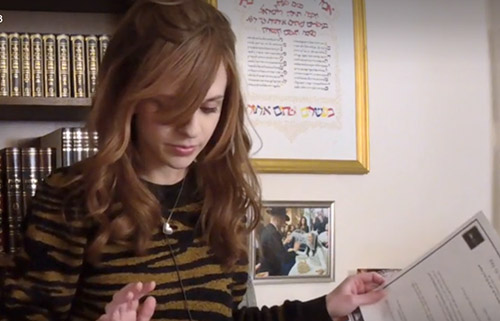

At a kickoff event held in February at the home of Miriam and Allen Pfeiffer, 150 women gathered to initiate the Veha’er Women’s Learning Program. No print media or intense advertisement had been sent out prior to the event; just “buzz” and word of mouth. Why the large showing? According to founder Shuli Fuchs, the reason is simple. “Life happens and we tend to stagnate spiritually. Veha’er offers us the opportunity to assemble with like-minded women who are also involved in ‘real life’ and stop briefly to re-invigorate ourselves, renew the sparks of excitement at learning Jewish texts, rethink our personal potential through words of spiritual inspiration-all within a community of women who become our ‘sisters’ in this venture.”
Mother of four, ages 15 months to 7 years, Fuchs is a busy young woman teaching limudei kodesh at Bruriah High School as well as offering kallah classes to young women in the community. The subjects which she teaches can certainly serve as launching pads for the crucial inspiration and chizuk needed by high school young ladies in our times as they include Jewish philosophy and history, as well as Chumash, Pirkei Avot, Megillot, and other subjects over the years. However, as Fuchs observed her students several years out, she realized that after the “highs” of seminary in Israel, the dream of marriage, and perhaps the birth of children, the glow had faded and some of her young proteges were becoming “bogged down” by daily responsibilities and weren’t including time for spiritual and learning growth. Fuchs saw a need to address this “spiritual slump” and thus evolved Veha’er, the term suggesting “enlightening” as in “veha’er eineneinu,” enlighten our eyes. Fuchs resides in Monsey with husband Rabbi Zev Fuchs, rebbe at the Yeshivas Ohr Reuven Kollel where he also serves as general studies principal in the yeshiva’s high school.
Fuchs is assisted by Shanny Gejerman, a noted educator and kallah teacher, who shares her vision. Despite the plethora of online Torah offerings, they saw the need for a step beyond individual shiurim—to create a movement through which individuals become more actively involved and personally connected. Veha’er aims to address the reality in the lives of many women. Getting out of the house for events might not be feasible at times, yet the value of progressing together “as a team” is indispensable. As a result, all in-person events are recorded and available on the website, and shiurim series bounce between communities, to grant access to more and to bridge populations. Whether through the study of texts or the exploration of an aspect of spiritual growth, the women gathered are strengthened with inspiration and enthusiasm.
Fuchs and Gejerman felt that offering a three-part series as opposed to stand-alone shiurim would lend more opportunity for actual internal change and serious commitment to the venture.
Therefore, following the kick-off event, Fuchs offered the first three-part series, entitled “The Key to Simcha,” to young women in the Washington Heights community. The series, which took place in February, was highly successful and led to a great deal of positive feedback. Next, the program was brought to Fair Lawn, where Gejerman offered a three-part course focusing on family purity and emotional intimacy. Again, the series was met with enthusiasm. The shiurim were so successful that attendees requested a fourth session. After the additional session, attendees were offered the opportunity to have their anonymous questions addressed in a phone session, which will take place shortly after Pesach.
Some shiurim are entirely web-based, and those have been warmly received as well. Jaclyn Sova’s “A Deeper Look at Esther” series drew a large online audience and elicited much positive feedback. In less than two months since its launch, Veha’er programs have reached hundreds of women, while vehaer.org is visited by hundreds of online users. The website has now expanded to include written articles and an exciting innovation, Fuchs’s vision for the near future is to establish digital chaburahs. This cutting-edge concept will sign up a cohort of 10 women to a prearranged day and time to get together via video conferencing to study a predetermined text or concept over the course of a few weeks. In the privacy of their homes, women can be part of a larger, meaningful learning group which will provide them with intellectual stimulation and a peer-community with which they can engage in an interchange of ideas.
Following Pesach, two new three-part series will be presented in our community. Beginning on May 8 and continuing on May 15 and 22, Rebecca Skaist will present a three-part series in Passaic, at the Gejerman home, entitled “Making Tehillim More Real and More Relevant.” In Teaneck, beginning on May 13, and continuing on May 20 and June 3, at the Lewin home, Aviva Barnett will present a series entitled “Doing Discomfort With Dignity.” Barnett is the author of “Riding the Wave,” a work exploring the re-framing of mental patterns and strategies.
As their mission statement reads, “Rooted firmly in the belief in the fundamental role of the Jewish woman, Veha’er seeks to build a community of women looking to be part of something larger while deepening their own inner world.”
To become a part of this community and to discover more, visit www.vehaer.org.
By Pearl Markovitz
�













